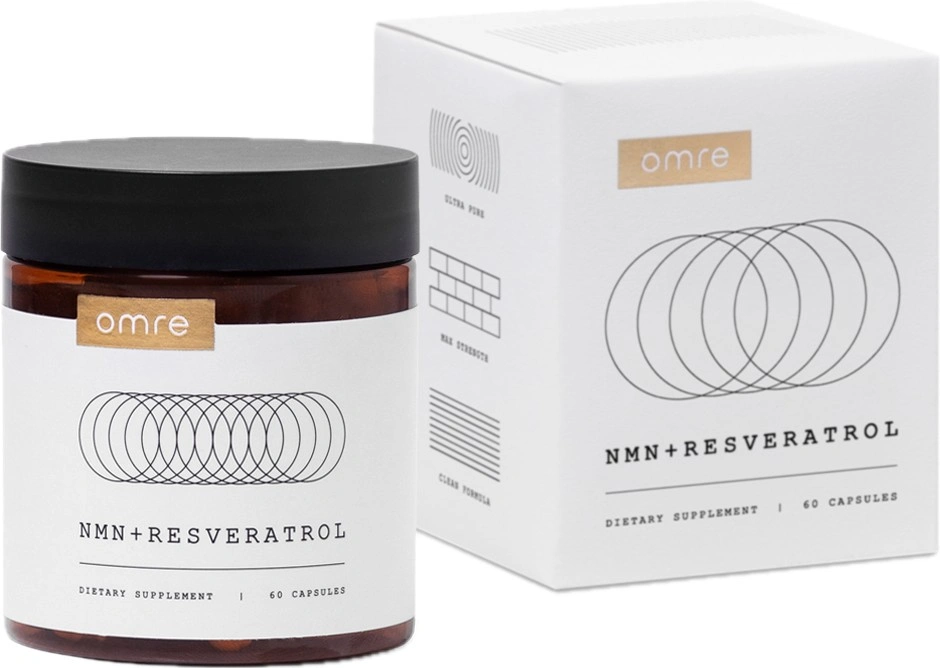Table of Contents
Here are some of the best mitochondria supplements people are using in 2025:
-
NMN
-
Urolithin A
-
CoQ10
-
Alpha-Lipoic Acid
-
PQQ
-
Calcium Alpha-Ketoglutarate
-
Acetyl-L-Carnitine
-
Creatine
-
Resveratrol
Each of these mitochondrial support supplements helps your cells in a slightly different way. Some help your body make more energy, some protect your cells from damage, and others clean up the worn-out parts so your system runs better.
This article will explain what each one does, what the research says, who might benefit most, and how much you may want to take.
Cellular NAD+ booster with ultra-pure NMN and Resveratrol, at research-backed doses.*NMN + RESVERATROL
Why Mitochondrial Health Matters
 Mitochondria are tiny parts inside your cells that work like power plants. They take the food you eat and turn it into energy your body can use. Every heartbeat, every thought, every movement—you need your mitochondria for all of it.
Mitochondria are tiny parts inside your cells that work like power plants. They take the food you eat and turn it into energy your body can use. Every heartbeat, every thought, every movement—you need your mitochondria for all of it.
But as we get older, these little energy producers don’t work as well. They slow down, get damaged, or even stop working. This can lead to lower energy levels, more fatigue, slower recovery, and even some health problems.
Things like stress, poor diet, lack of sleep, and toxins can make it worse. The result? You feel tired, your brain doesn’t feel as sharp, and your muscles may not work like they used to. Scientists even link this decline to the aging process itself.
The good news is that you can support your mitochondria through better lifestyle choices and high-quality mitochondrial health supplements. The ones listed below can help protect your mitochondria, clean up the damaged ones, or even help your body make new ones.
9 Best Supplements to Support Mitochondrial Function
Some supplements are especially good at helping your mitochondria work better. Here are nine worth knowing about.
1. NMN (Nicotinamide Mononucleotide)
NMN is a molecule your body uses to make NAD+, which is essential for energy production inside your cells. NAD+ also helps with DNA repair and supports healthy aging.
As we get older, our natural NAD+ levels drop. That can slow down how well our mitochondria function and affect how much energy our cells can make.
Studies have shown that taking NMN can raise NAD+ levels and improve mitochondrial activity (1). In one human trial, older adults who took NMN daily saw improvements in muscle performance and metabolism (2).
Animal studies have also reported better endurance and improved insulin sensitivity (3).
People often take NMN in doses ranging from 250 to 500 milligrams per day. It's usually taken in the morning because that's when NAD+ production is naturally higher.
If you're considering NMN, it’s worth choosing a product with good bioavailability since absorption can vary.
2. Urolithin A
Urolithin A is a compound that supports mitophagy, the process your body uses to clean out old and damaged mitochondria. This recycling helps keep your cells running efficiently.
Normally, your gut makes Urolithin A after digesting foods like pomegranates or berries, but not everyone produces enough due to differences in gut bacteria. Supplementing with Urolithin A has been shown to improve how mitochondria function.
In one study, older adults who took it for four months had better muscle endurance without changing their exercise routine (4). Researchers have also found that it helps cells maintain structure and energy output as they age (5).
Most supplements provide between 500 and 1,000 milligrams per day. It’s usually taken with food for better absorption. Since natural production in the gut can vary, a supplement is often the most reliable way to get it.
3. Coenzyme Q10 (CoQ10)
CoQ10 is found in every cell of your body, especially in organs that use a lot of energy like your heart and muscles. It plays a central role in the mitochondria, helping move electrons through the chain that produces ATP, the energy your body needs to function.
Your natural levels of CoQ10 decrease with age and can also drop if you’re taking certain medications like statins. This decline can make energy production less efficient and increase oxidative stress, which damages cells.
Several studies have found that supplementing with CoQ10 can improve energy metabolism, reduce fatigue, and support cardiovascular health (6).
The typical daily dose is between 100 and 300 milligrams. CoQ10 works best when taken with food that contains fat, as this helps absorption.
There are two forms: ubiquinone and ubiquinol. While both are effective, ubiquinol is usually better absorbed, especially in older adults.
4. Alpha-Lipoic Acid (ALA)
Alpha-lipoic acid is a powerful antioxidant that helps your cells manage oxidative stress, which can damage mitochondria over time.
It’s unique because it works in both water and fat, allowing it to reach deep into cells where it can neutralize harmful free radicals. It also helps regenerate other antioxidants like vitamin C and glutathione.
Research has shown that ALA is one of the supplements to help mitochondria function better, especially in the brain and nervous system (7).
A study reported that ALA improved energy metabolism and reduced signs of oxidative damage in older adults. It may also support blood sugar balance, which has its own link to healthier mitochondria (8).
The typical dose ranges from 300 to 600 milligrams per day. It’s available in two forms: regular ALA and R-lipoic acid (R-ALA), the natural form your body uses more easily. R-ALA tends to be more expensive but is absorbed better.
5. Pyrroloquinoline Quinone (PQQ)
PQQ is a nutrient that helps trigger mitochondrial biogenesis, which means your body starts producing new mitochondria. This process naturally slows down with age, but PQQ can help reactivate it by signaling certain pathways in your cells, like PGC-1α.
Several studies have found that PQQ not only helps increase the number of mitochondria but also supports their function and stability. It has also been shown to reduce inflammation and support cognitive performance, especially under stress (9).
In animal studies, PQQ helped preserve mitochondria in brain tissue and may help with memory and focus (10).
Common doses range from 10 to 20 milligrams per day. It’s usually taken with meals to improve absorption. Some people also combine it with CoQ10 or NMN for broader mitochondrial support.
6. Calcium Alpha-Ketoglutarate (Ca-AKG)
Calcium alpha-ketoglutarate is involved in the Krebs cycle, the process your mitochondria use to convert food into energy.
It also helps reduce oxidative stress by lowering the production of reactive oxygen species, which are byproducts of energy production that can damage cells if not kept in check.
Recent research has suggested that Ca-AKG may support healthier aging by improving how mitochondria function (11). In lab studies, it has been linked to better cell repair, stronger metabolism, and even longer lifespan in some animal models (12).
It also helps with collagen production and DNA maintenance, both of which decline with age.
A common dose is around 1,000 milligrams per day. Many people take it in the morning to align with natural energy cycles. While research in humans is still growing, early findings are promising for its role in energy support and longevity.
7. Acetyl-L-Carnitine (ALCAR)
Acetyl-L-carnitine is a form of carnitine that helps transport fatty acids into your mitochondria, where they’re turned into energy.
This process is especially important during periods of exercise or when the body relies more on fat for fuel. It also crosses the blood-brain barrier, which means it can support brain energy and focus.
Research has shown that ALCAR can improve mitochondrial function in both muscle and brain cells. It may help stabilize cell membranes and support the production of key mitochondrial compounds like cardiolipin (13).
Some studies suggest it may also reduce oxidative stress and improve mood and mental clarity in aging populations.
Typical daily doses range from 1,500 to 3,000 milligrams, often split into two servings. It’s usually taken in the morning and early afternoon to support daily energy levels and avoid interfering with sleep.
8. Creatine
Creatine is often thought of as a supplement for athletes, but its benefits go far beyond muscle. It plays a major role in maintaining and recycling ATP, the energy molecule produced by mitochondria. When cells need quick energy, creatine steps in to help refill those reserves.
Studies have found that creatine helps stabilize mitochondrial function, especially during physical or mental stress (14).
It may also protect brain cells and improve memory and thinking in some people. In muscle cells, creatine supports strength, recovery, and endurance by making energy production more efficient (15).
Most people take between 3 and 5 grams of creatine per day. Some choose to do a short “loading phase” of about 20 grams per day for a week, but this isn’t necessary for everyone. It mixes best with water or a smoothie and absorbs well with a small amount of carbohydrate.
9. Resveratrol
Resveratrol is a plant compound found in foods like red grapes, berries, and peanuts. It’s known for activating sirtuins, a group of proteins involved in mitochondrial function, stress resistance, and aging.
These proteins play a role in how your body responds to energy shortages and how efficiently cells work under stress. Research shows that resveratrol can support mitochondrial biogenesis, which is the process of creating new mitochondria (16).
It also helps reduce oxidative damage and inflammation, both of which can wear down mitochondria over time. Some animal studies have even linked resveratrol to improved metabolic health and longevity markers (17).
Common daily doses range from 250 to 500 milligrams. It is best taken with a meal that contains fat to improve absorption, since resveratrol is fat-soluble. Some people choose supplements that combine resveratrol with other polyphenols or NAD+ precursors for a broader effect.
Is It Safe to Take Mitochondria Supplements?
 For most healthy adults, mitochondrial supplements are generally considered safe when taken in proper amounts.
For most healthy adults, mitochondrial supplements are generally considered safe when taken in proper amounts.
These supplements use ingredients that naturally exist in the body or are found in common foods, like amino acids, vitamins, and plant compounds. When used correctly, they help support energy metabolism without causing major disruption to your system.
However, like any supplement, quality matters. Poorly made products may contain fillers, contaminants, or low-purity ingredients.
It’s important to choose options that are third-party tested and clearly list their ingredients and dosages. Supplements should also be stored properly and not taken in excess.
If you're pregnant, nursing, managing a medical condition, or taking prescription medications, it’s best to check with your doctor before starting any mitochondrial health supplements. While many of these ingredients have been studied for years, your personal health history still matters.
NMN + RESVERATROL
Cellular NAD+ booster with ultra-pure NMN and Resveratrol, at research-backed doses.*
Are There Any Side Effects?
Most people tolerate mitochondrial supplements well, especially when sticking to recommended doses. But some people may notice mild side effects in the beginning.
Possible side effects may include:
Nausea or upset stomach, especially when taken without food
Headaches, sometimes linked to changes in blood flow or energy use
Trouble sleeping if taken too late in the day (common with energy-focused ingredients)
Diarrhea or stomach cramps if the dosage is too high
These effects are usually mild and temporary. Taking supplements with meals and starting with a lower dose can help reduce discomfort. If symptoms continue, it may be worth adjusting the supplement or talking to a healthcare provider.
What to Look for in a Mitochondria Supplement
Not all supplements are made the same. Some have better ingredients, cleaner formulas, and better absorption than others. If you’re thinking about adding a mitochondria supplement to your routine, here are a few things worth checking:
Ingredient purity. Look for supplements that are at least 95% pure or higher. Lower-grade products may not deliver the results you're looking for.
Proper dosage. Make sure each serving contains enough of the key ingredients used in actual research studies. Underdosed products are common.
No fillers. Avoid products packed with unnecessary binders, colors, or artificial ingredients.
Third-party tested. Reputable brands will test their products for potency, purity, and contamination.
Clear labeling. You should see the exact amount of each ingredient on the label, not just “proprietary blends.”
If you're looking for a simple supplement that supports mitochondrial health, OMRE NMN + Resveratrol combines two well-studied ingredients in one daily dose.
It includes 500 mg of high-purity NMN and Resveratrol, which work together to support NAD+ levels and sirtuin activity, two key parts of healthy energy metabolism and aging.
What makes it stand out is its clean formula. There's no filler, and it includes BioPerine® to help your body absorb Resveratrol more effectively.
It’s made in a GMP and FDA-registered facility, and is best taken in the morning with a little healthy fat like yogurt or olive oil.
Lifestyle Tips to Support Mitochondrial Health Naturally
Supplements can help, but how you live day to day also plays a big role in how well your mitochondria function. Here are some practical lifestyle tips that can make a real difference:
Move regularly. Exercise helps your body make new mitochondria and improves the ones you already have. Walking, strength training, and interval workouts are all helpful.
Get good sleep. Deep, restful sleep gives your cells time to repair. Aim for 7 to 8 hours of consistent sleep every night.
Eat real food. A diet rich in whole foods, healthy fats, leafy greens, and berries supports mitochondrial function. Avoiding ultra-processed food also helps.
Manage stress. Chronic stress wears out your mitochondria. Breathing exercises, quiet time, and nature walks help your body recover.
Limit toxins. Smoking, air pollution, and even too much alcohol can damage mitochondria. Reducing exposure where you can makes a difference.
Stay cool and get sunlight. Cold exposure (like cold showers) and short sun breaks can improve mitochondrial efficiency when done safely.
Conclusion
Supporting your mitochondria can make a big difference in how you feel each day. From energy levels and brain function to healthy aging, the right supplements can help your cells work more efficiently.
Ingredients like NMN, CoQ10, Urolithin A, and others have all been studied for their role in energy production, cell repair, and oxidative stress support.
While lifestyle habits like regular movement, sleep, and a healthy diet still form the foundation, adding targeted supplements may offer an extra layer of support. Quality, purity, and proper dosing matter, so take time to choose wisely. If you’re interested in a well-rounded option that combines two of the most researched ingredients, you can check the availability of OMRE NMN + Resveratrol and see if it’s a good fit for your routine.
If you’re interested in a well-rounded option that combines two of the most researched ingredients, you can check the availability of OMRE NMN + Resveratrol and see if it’s a good fit for your routine.
FAQs
Can you take multiple mitochondrial supplements together?
Many of these supplements work well together because they target different areas of mitochondrial function. For example, NMN supports NAD+ production, while CoQ10 supports ATP production. Just avoid doubling up on similar ingredients unless recommended by a healthcare provider.
How long does it take to see results?
Some people notice improved energy or mental clarity within a few weeks, but it often takes 6 to 8 weeks of consistent use for more noticeable changes. Everyone responds a bit differently depending on age, lifestyle, and current health.
Are these supplements safe long-term?
When used at recommended doses and sourced from reputable brands, most mitochondrial supplements are safe for long-term use. Still, it's a good idea to review your routine with a healthcare provider once in a while, especially if you’re taking medications.
Do I still need to exercise and eat well?
Yes. Supplements support your mitochondria, but they don't replace good habits. Daily movement, sleep, stress management, and a real-food diet still do most of the heavy lifting when it comes to energy and longevity.
Can mitochondrial supplements help with brain fog or fatigue?
They might. Several ingredients like ALCAR, NMN, and creatine have been studied for their impact on mental clarity and energy. While not a cure-all, they may support better focus and stamina when used consistently.





